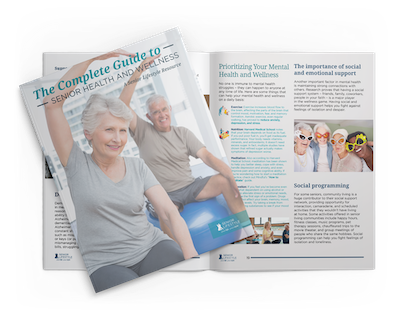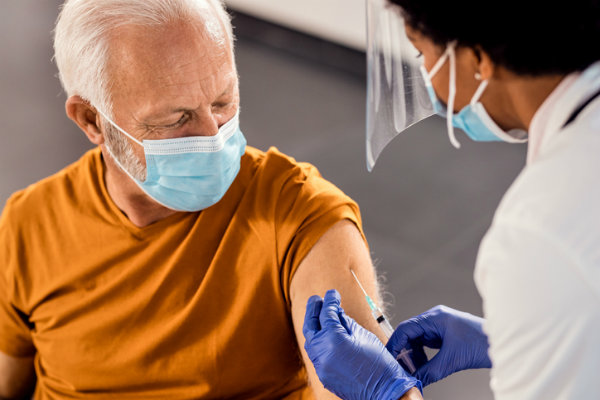Since COVID-19 vaccines were introduced in December 2020, 560 million doses have been given in the United States as of March 2022, according to Our World in Data, with 217 million Americans fully vaccinated – about 66% of all Americans.
The U.S. Centers for Disease Control and Prevention recommends a booster shot after the full dose, and a second booster is now being recommended for certain people.
There are good reasons for older people to get vaccinated. According to the CDC, the possibility of severe illness from COVID-19 increases with age, with the highest risk among senior adults. Although more than 70% of COVID-19 cases occurred in people under the age of 49, 83% of deaths occurred in people ages 50 and older, the CDC says.
Here are some things you need to know about the vaccines, why you should be vaccinated, what to know about COVID boosters for seniors, and some myths and truths about COVID vaccines.
*While we at Senior Lifestyle recommend receiving the COVID-19 vaccine and boosters for those 65 and older, we understand that this is a personal decision and should be talked about with family and caregivers prior to making the decision.
Facts About the COVID Vaccines
The main vaccines available right now are Pfizer, Moderna and Johnson & Johnson. Here are some facts about the vaccines, according to the Mayo Clinic and WebMD:

Facts About COVID Boosters
The CDC has indicated that most people who are vaccinated need booster shots. This is because the vaccines have shown a decline in effectiveness over time.
It recommends that everyone 18 and older get a booster shot either 6 months after their second Pfizer or Moderna dose, or 2 months after their full Johnson & Johnson vaccine. People ages 16 and 17 should get a booster dose of Pfizer at least 6 months after their first dose.
The CDC recommends a second booster to people with compromised immune systems or to those over 50 who received their first booster at least four months ago.
Although virus variants, like Delta and Omicron, have popped up, the vaccines and boosters have shown to be effective against them, the CDC says.
10 Misconceptions About the COVID Vaccines
Many misconceptions about the vaccines have arisen, everything from suspicion over their rapid development to what is included in them. These myths may be preventing people from getting vaccinated.
Here are some of the more common COVID vaccine misinformation points being shared and the truth about them from the Mayo Clinic and Cleveland Clinic.
-
The Vaccines Are Unsafe Because They Were Developed and Tested Too Rapidly
Two factors led to the rapid development of the vaccines: The nature of the pandemic and the deployment of new technology.
The emergency nature of the COVID-19 pandemic led pharmaceutical companies to find a rapid solution. The U.S. government also prioritized finding a vaccine quickly, employing Operation Warp Speed to help accelerate development while maintaining standards for safety and efficacy.
The vaccines use a new technology called messenger RNA, or mRNA. Although this is the first time it’s being widely used in a vaccine for the public, researchers have actually been working on this vaccine strategy for more than three decades.

Download The Complete Guide to Health & Wellness for Seniors
As people grow older, their health and wellness needs change. Read our eBook, “The Complete Guide to Health & Wellness for Seniors” for everything you need to know about staying healthy and happy as we age.
Download the Guide-
The Vaccines Will Give People COVID-19
These vaccines enable your immune system to recognize and fight off a disease, but they don’t actually infect you.
The vaccines introduce mRNA into your cells, which instructs them to make a piece of the protein that’s present on the COVID-19 virus. Those protein pieces trigger your immune system to mount a response to fight the virus, but they don’t harm your body.
-
We Don’t Know What’s in These Vaccines
Ingredient lists have been published for all the vaccines. Besides using mRNA, the vaccines contain lipids, or fats, to deliver the mRNA into cells, plus a few other common ingredients intended to maintain the vaccine’s stability. Conspiracy theories circulated on social media say they contain microchips or tracking devices, but they do not.
-
These Vaccines Will Alter People’s DNA
The vaccines use mRNA to launch an immune response to the COVID-19 virus. Once the mRNA does that, the body’s cells break it down and get rid of it.
-
People Who Have Had COVID-19 and Recovered Don’t Need a Vaccine
There is not enough information currently available to say if or for how long after infection someone is protected from getting COVID-19 again. This is called natural immunity. However, some evidence indicates that natural immunity from COVID-19 may not last long.
Experts advise that it is appropriate to be vaccinated even if you’ve had COVID-19.
-
The COVID Vaccines Cause Severe Side Effects in the Elderly
Short-term mild or moderate COVID vaccine reactions in the elderly and among others have been reported, but they go away without complication or injury. Chills, fatigue, fever, headache, injection site pain and muscle pain have been reported in some people. These COVID vaccine side effects are actually an indication that your immune system is responding to the vaccine and are common when receiving vaccines of all types.
-
There Is No Need to Wear a Mask After Getting Vaccinated
The CDC has gone back and forth on the need for masks. Recommendations are based on the current level of cases and how easily they transmit. You can check your county’s infection level and recommendations at the CDC COVID-19 Community Level page.
The CDC recommends wearing masks in public if you don’t have a condition preventing you from doing so, but local governments and businesses may have their own requirements.
-
Since COVID-19’s Survival Rate Is So High, a Vaccine Is Unneeded
While it’s true that most people who have gotten COVID-19 have recovered (around 98%), it’s also true that more than 6 million people worldwide have died from the virus, according to the World Health Organization. Because the disease can damage the lungs, heart and brain, it may also cause long-term health problems that experts are still working to understand.
The vaccine also protects those around you, since many infections appear to be spread by people who are not sick but are carrying the virus. Widespread vaccination protects populations, including those who are most at risk and those who can’t be vaccinated. It will be important for ending the pandemic.
-
The Vaccine Has a Microchip to Control the General Population
There is no microchip in the vaccine, and it will not track people or gather personal information into a database.
-
The Vaccines Were Developed Using Fetal Tissue
Fetal cells were not used in either the development or production of the Pfizer and Moderna vaccines.
If you have more questions about the vaccine, talk with your trusted health care provider or look to reliable sources like the Centers for Disease Control and Prevention or the World Health Organization.
Learn More About Safety at Senior Lifestyle Communities
Senior Lifestyle takes your health seriously. Find out more about senior wellness and our response to COVID-19. Learn more about our senior community options by contacting us today.

